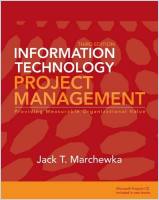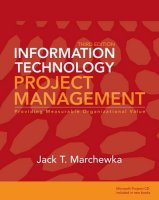
Why did I choose this resource?
I chose this resource to expand my knowledge of project management specifically relate to information technology.
What did you learn from it?
I learned what sets information technology projects apart from others, the best way to execute them, and how to handle risks and change to a project.
Key Knowledge
- IT projects are set apart from other because they involve both technical systems and a variety of people, creators and users.
- When applying a new IT system make sure to always, document how to use them, who should use them, and how they are going to be used by the business.
- Project charter should include MOV, (Measurable Organizational Value – an independently verifiable gauge of your project’s success, as approved by your stakeholders.)
- Impress the importance of a project and its affect on day to day business to the IT manager.
- Project scope should include details about change requests
- How to change the project scope
- Who is financially responsible
- How to manage those affected by the change
- Creating Project Estimates
- “The Delphi technique” – Multiple influences that reach one verdict
- “Time-boxing” – All work has a time limit
- “Top-down estimating” – Establish how long a project should take without considering set backs
- “Bottom-up estimating” – Establish how long a project will take by adding up time needed for each task; based on personal experiences.
- Project management software is extremely valuable, but needs to be used correctly.
- Research risks of a project, but remember risks can also turn into a higher profit.
- COMMUNICATION IS KEY! Make it standardized.
- Clearly define the requirements for a task to be considered complete.
- Formal procedures allow for projects to move along smoothly
- IT managers must always remember it is human nature to return to old habits when they are not being monitored, unless the individual believes they made the decision to change.
- Processes that MUST be done when outsourcing to avoid issues :
- Planning
- Contracting
- “Asking sellers for responses to your procurement request”
- Selecting Vendors
- Managing the conditions of the contract
- Closing out the procurement
- Determine the type of leadership the project requires based up your team, their situations, and the tasks at hand.
- Review every project after completed and document all information. Include feedback from stakeholders, management, and the team.
How are you using what you learned?
I am using what I learned to continuously update our project management process to make it more effective and efficient.
Key Changes / Key Actions
- Schedule a formal review when a project is completed.
- Include a “manual” for all software created/given/bought for clients.
Source
- Name : Information Technology Project Management
- Author : Jack T. Marchewka
- getAbstract.com: Link to Book


